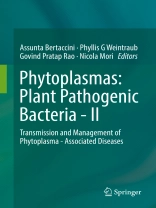Phytoplasma-associated diseases are a major limiting factor in the context of the quality and productivity of many ornamental, horticultural and other economically important agricultural crops worldwide. Annual losses due to phytoplasma diseases vary, but under pathogen-favorable conditions they have disastrous consequences for the farming community. As there is no effective cure for these diseases, the management options focus on their exclusion, minimizing their spread by insect vectors and propagation materials and on the development of host plant resistance.
This book discusses the latest information on the epidemiology and management of phytoplasma-associated diseases, providing a comprehensive, up-to-date overview of distribution, occurrence and identification of the phytoplasmas, recent diagnostics approaches, transmission, losses and geographical distribution as well as management aspects.
İçerik tablosu
Chapter 1. Insects as phytoplasma vectors: ecological and epidemiological aspects.- Chapter 2. The biology and ecology of leafhopper transmission of phytoplasmas.- Chapter 3. Psyllid vectors.- Chapter 4. Vector role of cixiids and other planthopper species.- Chapter 5. Transovarial transmission in insect vectors.- Chapter 6. Phytoplasma transmission by seed.- Chapter 7. Transmission of phytoplasmas by agronomic practices.- Chapter 8. Control of phytoplasma diseases through resistant plants.- Chapter 9. Phytoplasma elimination from perennial horticultural crops.- Chapter 10. Microbes relationship with phytoplasmas in plants and insects.- Chapter 11. Integrated management of phytoplasma diseases.
Yazar hakkında
Dr. G.P. Rao is a Principal Scientist in Plant Pathology at the Indian Agricultural Research Institute, New Delhi. He has 30 years of research experience in the field of plant pathology, especially sugarcane diseases, cereal viruses, and phytoplasmas. He has published over 135 research papers and authored or edited 20 books. He also guided MSc and Ph D students on different aspects of plant pathology. He is Editor-in-Chief of Phytopathogenic Mollicutes and has received several national and international and awards. He has visited 30 countries for invited talk, postdoc fellowships, research training, panel discussions and for workshops and conferences.
Dr. Assunta Bertaccini is a Professor of Plant Pathology at the University of Bologna, Italy. In more than 40 years of research, her major studies were devoted to plant diseases associated with phytoplasmas and bacteria, focusing on their biology and epidemiology. She was an invited speaker at national and international meetings and seminars around the globe. She has received numerous awards, including the Emmy Klienenberger-Nobel Award for distinguished research in mycoplasmology. She is the author of 800 publications, Editor-in-Chief of Phytopathogenic Mollicutes, Senior Editor of Phytopathologia Mediterranea, and founded and heads the International Phytoplasmologist Working Group (IPWG).
Dr. Phyllis Gail Weintraub is Research Scientist in Entomology at Gilat Research Center, Nagev, Israel. Her research focuses primarily on applied and field research in non-chemical pest control (physical and biological) in greenhouses, and identification and characterization of phytoplasmas and their insect vectors. She has been an invited speaker at national and international meetings and seminars and is the author or coauthor of 160 publications, including books and book chapters. She is the Editor-in-Chief of the Journal of Insect Science, and serves as a reviewerfor numerous international scientific journals.
Dr. Nicola Mori is a Professor of General and Applied Entomology at the Department of Agronomy, Food, Natural Resources, Animals and Environment (DAFNAE), University of Padova, Italy. His research focuses primarily on the epidemiology and transmission of phytopathogenic agents and integrated pest management. He is a consultant and adviser to the Phytosanitary Italian Service on phytoplasmas insect vector control and the side effects of chemical control on agricultural ecosystems, Author of more than 50 publications, he is a reviewer for more than 10 international journals listed in WOS/SCOPUS databases, as well as for national and international institutions.












